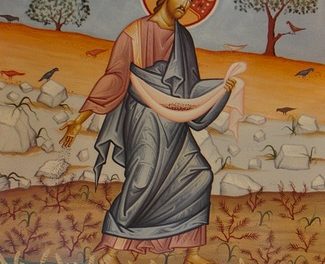Acts 10:25-26, 34-35, 44-48
Ps 98:1, 2-3, 3-4
1 Jn 4:7-10
Jn 15:9-17
What is love? Our post-Easter readings have taken us through the winding discourses of the Johannine Gospel and first epistle on the nature of love. This week’s readings deepen the exploration of love and also make more explicit the importance of love in the Christian moral life.
It is often said that John’s Gospel does not have an ethic outside of just “love.” John is missing the distinctive moral teachings of Jesus such as we find in the Sermon on the Mount. This may be true, but in his portrayal of love, John gives us perhaps the most rigorous ethic of all. Love is, first of all, characterized by unity. In last week’s reading, we heard Jesus say that he is the vine and his followers the branches (Jn. 15:5). Jesus will later pray that the church (that is, his community of believers both present and future) will be one with him just as he is one with the Father (Jn. 17:11). What is it that makes such unity possible? Love: “As the Father loves me, so I love you. Remain in my love.” Love is what binds the Father, Son, and Spirit together and it is what also binds the Church.
We see the unifying effects of love in our reading from Acts. Jewish followers of Christ see Gentiles receiving the Holy Spirit and Peter demands that they be baptized. The God revealed in Jesus is the Lord of all (Acts 10:36). As such, there cannot be divisions in the Church among the circumcised and uncircumcised believers. The love that unites the persons of the Trinity unites also the church. And if God is love, the Church too ought to be love. But this is so much easier said than done. How difficult it must have been for the Jews, God’s chosen people from whom came the covenants, the prophets, the Law, and the Messiah to watch the unclean Gentiles receiving the Holy Spirit and to have to now call the Gentiles brothers and sisters in Christ.
In our reading from this week, Jesus further clarifies what love is: “No one has greater love than this than to lay down his life for his friends.” Love is characterized by self-sacrifice, which Jesus, of course, perfectly manifests on the cross. Self-sacrifice is closely related to the first characteristic of love—unity. Unity is only possible by “laying down one’s life.” For the Jews to be one with the Gentiles, they had to sacrifice their pride in the Law and in their ancestry. They had to see themselves as on the same level as the Gentiles. So too with Jesus’ disciples as they watched him dine with prostitutes, tax collectors, and sinners. The disciples might not have been asked to literally die in these moments, but it must have felt almost like a fate worse than death to realize that they—Jesus’ chosen—were asked to be united with those who they thought so much less of. This command of love has its parallel in the Sermon on the Mount to forgive one’s enemies, to not resist a wrongdoer, and to go an extra mile when conscripted.
Third, love is characterized by obedience, which again is connected to the characteristics of unity and self-sacrifice. “If you keep my commandments, you will remain in my love,
just as I have kept my Father’ s commandments and remain in his love.” Obedience is also a call to put aside pride and concern for one’s own “righteousness” in order to “listen to” (the literal meaning of obedience) a higher authority. Once again, the obedience characteristic of love has as its model the obedience Christ who “learned obedience from what he suffered” (Heb. 5:8).
John tells us that the reward of obedience if friendship with Christ. In other words, if obedience is characteristic of love, obedience also deepens love. We obey because we love Christ, but in obeying, we come to a fuller love of Christ. Moreover, obedience is necessary for unity. The unity of Gentiles and Jews in the early Church is only possible by the Church obeying Peter and Paul in their command to baptize the uncircumcised and to welcome them into the Church.
Obedience is perhaps the most difficult characteristic of love to swallow. The emphasis on obedience has led to many abuses of love, especially within marriages. Nevertheless, John’s Gospel reminds us of how important obedience is. Transformation in Christ is not just an individual experience; it happens primarily through the unity of the Church. The expression of that unity is love, and love is obedience to the demands of Christ. D. Moody Smith writes on this point, “[B]eing a disciple means not only believing in Jesus Christ, but belonging to him, being united with him, and obeying his commands. The Johannine Jesus encourages the reader to abide with Jesus, even to see intimacy with him through believing obedience” (The Theology of the Gospel of John, 154).
This rigorous ethic of love is made possible in the post-resurrection Church by the gift of the Holy Spirit. As Pentecost approaches in a few weeks, let us prepare by seeking unity in our families, workplace, and church by seeking unity through self-sacrifice and obedience.




